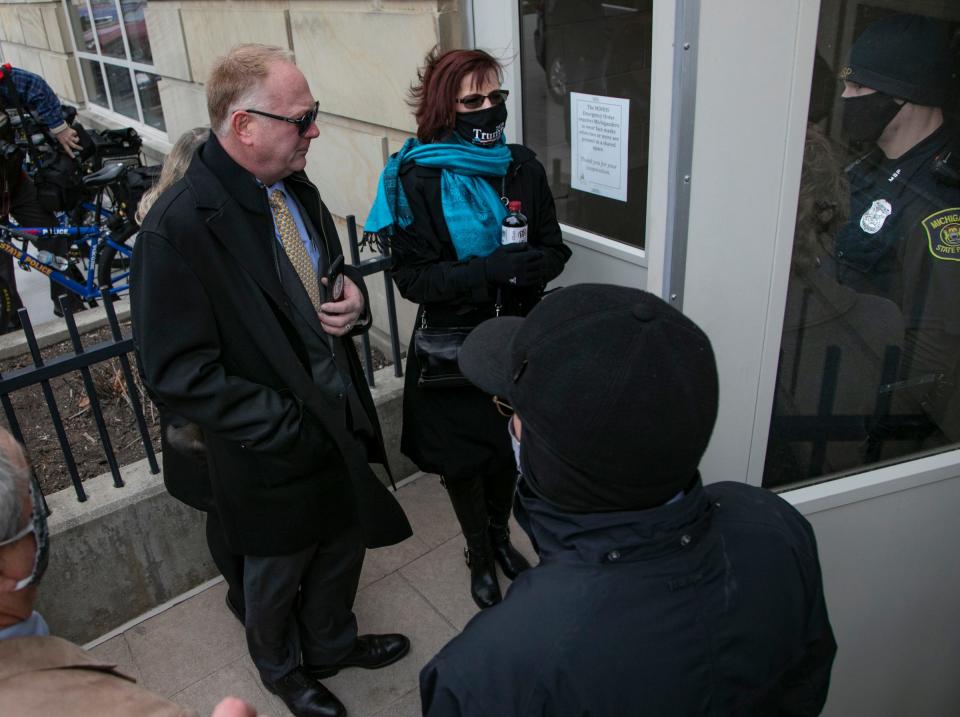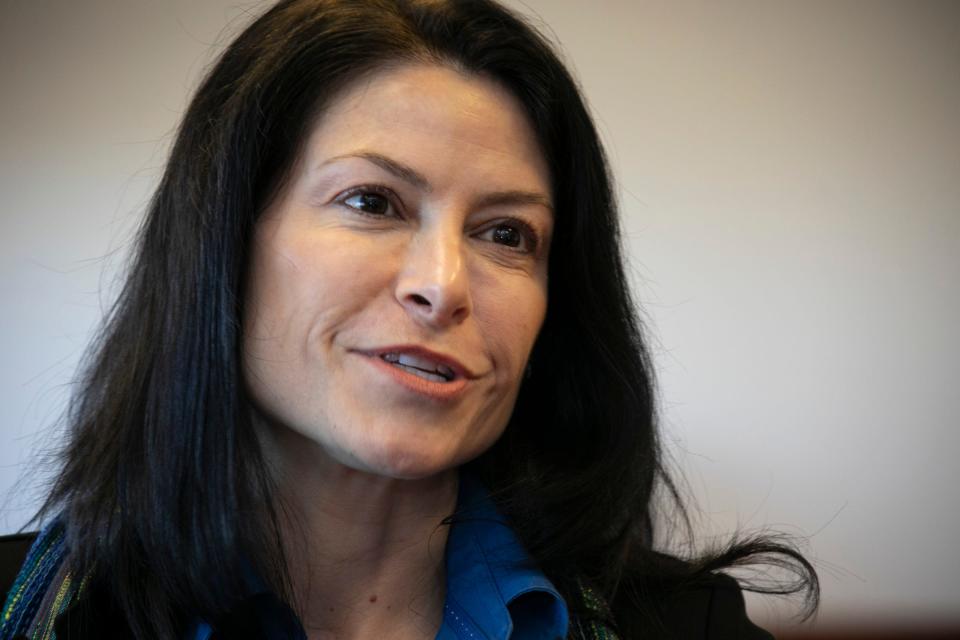Nessel: Fake GOP electors committed crimes, hopes feds prosecute 'conspiracy'
- Oops!Something went wrong.Please try again later.
- Oops!Something went wrong.Please try again later.
- Oops!Something went wrong.Please try again later.
There's no question a troop of faux GOP electors violated the law when they signed on to phony documents and tried to barge into the Michigan State Capitol in an effort to fraudulently award the state's electoral votes to former President Donald Trump, says Attorney General Dana Nessel.
But, given the scope of what Michigan's top law enforcement official called a "conspiracy," Nessel says the criminal prosecution of at least the 16 sham Republican delegates is better suited for federal authorities.
"Seemingly there's a conspiracy that occurred between multiple states. So if what your ultimate goal is, is not just to prosecute these 16 individuals, but to find out who put them up to this, is this part of a bigger conspiracy at play in order to undermine the legitimate results of the 2020 presidential election, not just in Michigan but nationally? ... It creates jurisdictional issues," Nessel said Tuesday during a virtual news conference.
"I feel confident we have enough evidence to charge if we decide to pursue that. Again, I want to make it clear, I haven't ruled it out. But for all the reasons I stated, I think that it's a better idea for the feds to pursue this."

More: GOP attempt to award Mich. Electoral College votes to Trump referred to feds, Nessel says
More: Michigan's Electoral College delegates cast all 16 votes for Joe Biden, Kamala Harris
Nessel recently confirmed the existence of the more than yearlong investigation into possible election fraud, forgery and other charges against the knockoff delegates during an MSNBC interview.
On Dec. 14, 2020, Michigan's 16 legitimate Electoral College delegates met in the state Capitol to formally cast their votes for Joe Biden. Biden won Michigan by more than 154,000 votes.
However, the Republican crew — which included some who would have been Electoral College delegates had Trump won and was aided by several Republican lawmakers — also tried to get into the building. They were denied entry.
The building was closed to most that day, in part because of COVID-19 concerns and because state Rep. Gary Eisen, R- St. Clair Town, had suggested groups would come to the Capitol. He wouldn't rule out that there would be violence; a Senate spokeswoman told the Free Press at the time the upper chamber had received "credible threats of violence."
It turned out to be a relatively peaceful, cold day. But the abject rejection did not deter the Trump slate's efforts to seek legitimacy.
Nessel said Tuesday someone sent copies of the doctored documents proclaiming Trump's win in Michigan to the four institutions required to receive Electoral College documents: the office of Vice President Mike Pence, the Michigan Secretary of State, the National Archivist and the chief judge of the western district of Michigan.
Later, Trump-affiliated attorney Sidney Powell and her so-called Kraken legal team referenced the actions of the fake GOP electors in their legal filings related to Michigan's election. They argued, wrongly, that the Legislature supported the phony electors and suggested they cast their votes at the state Capitol on the appropriate day.
The archivist rejected the document, notifying Nessel and others in the process. The documents are also part of the U.S. House's broad January 6 commission inquiry.

The Michigan Republican Party issued a statement after Nessel's cable television interview, accusing the attorney general of a carrying out a partisan investigation.
“Dana Nessel is playing political games with people’s lives and livelihoods for the sake of scoring political points ahead of an election," party spokesman Gustavo Portela said.
Nessel waved off the attack, noting she has charged Democrats with election fraud in the past.
She said she referred the allegations to federal prosecutors last week in the state's Western District. She hasn't heard back, but she doesn't necessarily expect updates.
That means she may wait with the general public to see whether the U.S. Attorney prosecutes anyone. There's a chance the office already reviewed the same evidence and decided against charges.
Nessel acknowledged this, while emphasizing she "absolutely" had enough evidence to bring state charges. However, she thought the mutlistate jurisdictional issues made the prosecution best suited for the feds.
The possible state charges also have a six-year statute of limitations: She said there's no broader harm in waiting, as long as there is accountability eventually.
More: New Supreme Court filing includes blatantly wrong information about Michigan
More: Michigan House punishes GOP Rep. Gary Eisen for hinting at Electoral College disruption
Contact Dave Boucher: dboucher@freepress.com or 313-938-4591. Follow him on Twitter @Dave_Boucher1.
This article originally appeared on Detroit Free Press: Nessel: Fake GOP electors committed crimes, hopes feds prosecute

